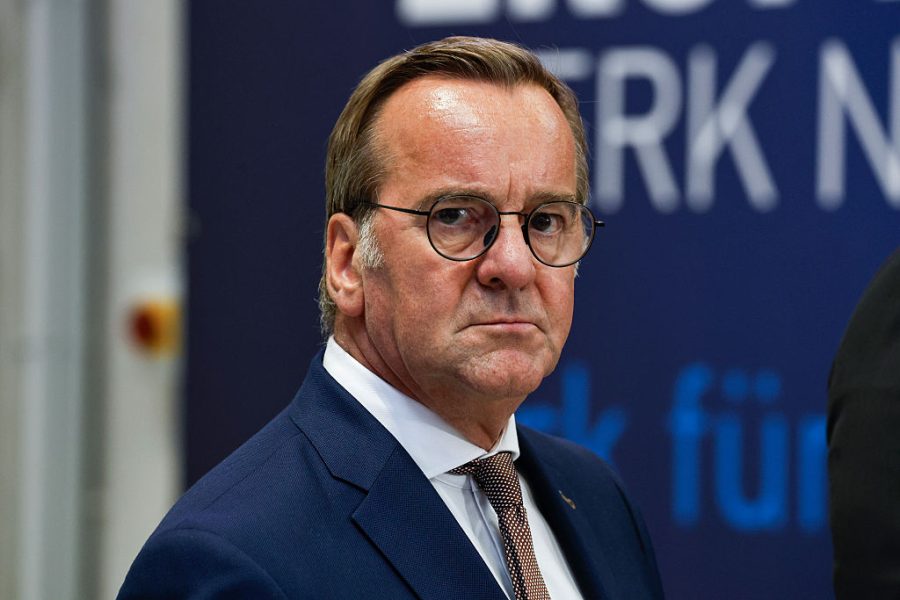“The firewall has fallen!” Alice Weidel, co-leader of the far-right Alternative für Deutschland (AfD), posted on X, barely able to contain her excitement. The firewall (“Brandmauer”) refers to the agreement by Germany’s establishment parties never to endorse or collaborate with the AfD. Last week, it was breached — for the first time in the history of the federal German parliament, a motion was passed with the AfD’s help.
The person responsible was the man tipped to be Germany’s next chancellor: Christian Democratic Union (CDU) leader Friedrich Merz. Merz’s motion called on the government to reintroduce permanent border controls, block all attempts to enter the country illegally and prioritize the arrest and deportation of illegal immigrants. Since the vote was not legally binding, Merz’s aim was threefold: cement his image as a migration strongman, stem the flow of voters rushing away from the center-right towards the AfD and embarrass the center-left, particularly the Social Democratic Party (SPD). Merz’s motion passed by just three votes. Two days later Merz tabled a second, this time legally binding, motion to tighten the country’s asylum laws, which was rejected by twelve votes. Once again, to apoplexy of the governing coalition parties, he relied on AfD support.
Chancellor Olaf Scholz called Merz’s actions “unforgivable,” Rolf Mützenich, chair of the SPD parliamentary group, drew agitated comparisons with the fall of the Weimar Republic before urging Merz to “re-establish” the firewall. “Your fall from grace will always accompany you,” he said. “But we can still close the gateway to hell together.”
It is two weeks until Germany’s federal election and the establishment political parties are panicking. The AfD is in second place in the polls, with nearly 21 percent of the vote. According to one poll, it may win every one of the former East German states. As well as battling among themselves for votes, the SPD, CDU, Free Democratic Party (FDP) and Greens face another problem: how can they keep the AfD from achieving its highest–ever share of seats in the Bundestag? And how can they stop the party further shaping the country’s political landscape? In four years, they might not have the same chance.
State branches of the AfD are fundraising by selling deportation-themed calendars
In December, when Scholz called an early election, neither he nor the leaders of the other establishment parties predicted that migration would eclipse every other issue in the campaign. This changed after six people were killed and nearly 300 injured when a Saudi migrant with a history of mental illness plowhed a BMW into the crowd at Magdeburg’s Christmas market. A month later, on January 22, in the Bavarian city of Aschaffenburg, a failed asylum seeker from Afghanistan attacked a group of preschool children in a park with a knife. Two were killed (including a two-year-old) and three injured.
For the AfD, these attacks have been an opportunity to push for “re-migration,” meaning mass deportations of “culturally other” migrants. Until the start of this year, Weidel avoided using this term. She preferred to talk in vaguer, blander language about “deportations” and “repatriations.” After years of trying to present a more moderate face for the party, at the AfD’s conference in Riesa, Saxony last month, Weidel finally let loose. She promised, if elected, to enforce deportations on “a large scale.” “If we must call it ‘remigration,’ then remigration it must be,” she said.
Once, “remigration” was a euphemistic buzzword of the AfD’s most extreme wing. Now the party has thrown itself behind it with gusto. Several state branches of the AfD are fundraising by selling deportation-themed 2025 calendars. Saxony-Anhalt’s — the cover of which depicts a plane in flight overlaid with the slogan “Take-off instead of benefit fraud” — can be acquired for a donation of more than €50 to the party. Saxony-Anhalt is one of the three states in which the party’s regional association is legally classified as a right-wing extremist group. It is expected to win that state comfortably.
Baden-Württemberg’s calendar features twelve pages of photos of planes mid-flight and AfD manifesto quotes. Each image is headlined with a catchy slogan: the party’s state leader, Miguel Klauß, says August’s entry — “Have a good trip, Habibi!” — is a “particular highlight” for him.
The AfD’s moment has arrived. The party is thrilled with the series of endorsements it has received from Elon Musk since Christmas. First, he wrote on X that the AfD was the only party that “can save Germany,” following this up with an op-ed in the Welt am Sonntag newspaper. A fortnight later, he hosted Weidel for a conversation on X that touched on migration, crime and — bizarrely — the claim that Hitler was the “exact opposite” of “right-wing.” He was, according to Weidel, “a communist.”
Musk then gave even more full-throated support, beaming into the AfD’s campaign launch rally in the Saxony-Anhalt city of Halle for a surprise appearance from the US. He was welcomed with loud whoops and cheers from the crowd. He referenced the country’s Nazi history and said that there is “too much of a focus on past guilt and we should move beyond that” — an echo of the words of senior AfD party figures.
Merz has decided that the only way to beat the AfD is to salvage the CDU’s reputation over migration. This means completely rejecting Angela Merkel’s legacy. The day after the Aschaffenburg attack, he announced: “If I am elected chancellor of the Federal Republic of Germany, using the chancellor’s power to issue directives, I will, on my first day in office, order the federal ministry of the interior to permanently control the German state borders with all our neighbors and to reject all attempts at illegal entry without exception.”
He blamed the EU’s “dysfunctional” Dublin and Schengen freedom of movement agreements and clarified that his border crackdown would apply to refugees. He also promised to give the federal police powers to oversee the arrest, detention and deportation of illegal migrants and make responsibility for deportations a federal — rather than state — power.
By promising to close Germany’s borders to refugees, Merz is taking a gamble. Neither of the CDU’s probable coalition partners after the election — the SPD or Greens — is going to agree to such a strong measure. The FDP is the only establishment party that’s said it would be willing to work in coalition with Merz under these terms, but it may not even reach the 5 percent hurdle needed to make it into parliament.
Merkel, too, didn’t take kindly to her liberal legacy being trashed by her successor. A day after the Bundestag vote, she issued a statement scolding Merz for indulging in “tactical maneuvers.” “It is wrong to… knowingly allow the AfD to gain a majority in a vote in the German Bundestag for the first time,” she said.
Yet Merz’s proposal is undeniably popular. In the aftermath of a knife attack in Solingen in August in which three people were killed and eight injured (Islamic State has claimed responsibility), polls revealed that 45 percent of the population “fully support” closing Germany’s borders. Five months and two attacks later, the support has grown to two-thirds.
How far is Merz willing to go? He still insists that his Bundestag motion is not a sign that he would collaborate with the AfD if he took power. Last month, he promised he wouldn’t “sell the soul of the CDU” to the AfD. “I am hinging my future as party leader of the CDU on this issue,” he said. Yet his pledge — or threat? — to ram through his measures “regardless of who agrees with them” has spooked the other establishment parties, and some members of the CDU. Both in public and private, many members have expressed horror at the situation in Austria, where attempts by establishment parties to form a government collapsed, leaving the leader of the far-right Freedom Party (FPÖ) Herbert Kickl on the verge of power. “It’s actually crazy that the FPÖ could soon nominate the chancellor,” says Art Pusch, who’s standing to become the CDU member of parliament for Halle. “That is simply something that we can’t allow to happen in Germany.”
There are also those who doubt whether Merz’s pledge to close Germany’s borders permanently is feasible. The SPD has said it is “unconstitutional” in both German and EU law. It has also been pointed out that, under an emergency clause in the EU constitution, Germany’s land borders have technically already been subject to “temporary” checks since October 2023.
Merz knows that his credibility depends on his ability to follow through on his pledges. So does trust in Germany’s establishment parties. If he fails to solve illegal migration as chancellor, he will only push more voters into the arms of Weidel come 2029. In the words of Jens Spahn, the CDU member and former member of Merkel’s cabinet: “Either the democratic center ends illegal migration to Germany — or illegal migration ends the democratic center in Germany.”
Lisa Haseldine and Elisabeth Dampier discuss the breakdown of the German “firewall” and whether the AfD are unstoppable on the latest Edition podcast:

























